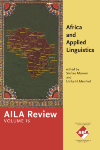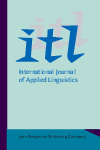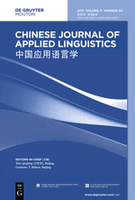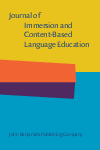
ELIA-Estudios de Linguistica Inglesa Aplicada
Scope & Guideline
Pioneering Studies in Applied Linguistics: Your Gateway to New Insights
Introduction
Aims and Scopes
- Applied Linguistics and Language Education:
The journal publishes research that explores applied linguistics theories and their application in English language teaching contexts. This includes methodologies, instructional strategies, and assessment practices. - Bilingualism and Language Policy:
A significant focus on bilingual education and family language policies, particularly in multilingual contexts, is evident. This includes studies on how families and educational institutions navigate language use in diverse settings. - Technology in Language Learning:
Research on the integration of technology in language education is a core area, examining tools and resources that enhance learning outcomes, such as online dictionaries, digital genres, and social media. - Sociocultural Dynamics of Language:
The journal addresses the sociocultural factors influencing language acquisition and usage, including identity, community engagement, and the impact of migration on language practices. - Teacher Development and Perceptions:
The experiences and perceptions of teachers in implementing language education practices, particularly in Content and Language Integrated Learning (CLIL) environments, are a key area of investigation.
Trending and Emerging
- Incidental Learning and Vocabulary Acquisition:
There is a growing interest in how incidental learning occurs within language education, particularly through the use of captions and multimedia resources to enhance vocabulary acquisition. - Sociodidactics of Minoritized Languages:
Post-pandemic discussions on the sociodidactics of minoritized languages have emerged, focusing on the integration of these languages into educational practices and community engagement. - Peer Interaction and Collaborative Learning:
Research exploring the dynamics of peer interaction, especially in mixed-age settings, indicates a trend towards understanding how collaborative learning can support language acquisition. - Cultural Identity and Heritage Language Education:
The exploration of cultural identity within heritage language contexts is gaining traction, emphasizing the importance of recognizing and preserving linguistic diversity in educational settings. - Digital Pedagogy and Emerging Genres:
The analysis of digital communication forms, such as Twitter conference presentations, signifies an emerging focus on how technology shapes language use and pedagogical practices in contemporary education.
Declining or Waning
- Traditional Language Teaching Methods:
Research centered on traditional approaches to language teaching has decreased, reflecting a broader shift towards more innovative, communicative, and technology-enhanced methodologies. - General Language Proficiency Studies:
While still relevant, studies focusing solely on language proficiency without contextual or sociocultural considerations are less frequently published, indicating a move towards more integrated and holistic approaches. - Static Language Assessment Practices:
There is a noticeable decline in research that emphasizes static or standardized testing methods, as the field increasingly recognizes the need for dynamic and formative assessment practices.
Similar Journals

English Teaching and Learning
Elevating Language Instruction with Cutting-Edge InsightsEnglish Teaching and Learning is a distinguished academic journal published by SPRINGER SINGAPORE PTE LTD, focusing on the dynamic fields of education and linguistics. With an ISSN of 1023-7267 and an E-ISSN of 2522-8560, this journal serves as a vital platform for researchers, educators, and practitioners interested in advancing the understanding of English language instruction and learning methodologies. Recognized for its high standards, it has achieved a notable Q2 ranking in Education and a prestigious Q1 ranking in Linguistics and Language in 2023, underscoring its impact within these essential scholarly fields. The journal, which spans a converged publication period from 2015 to 2024, endeavors to disseminate innovative research, theoretical insights, and practical applications, making it an invaluable resource for anyone committed to enhancing English education globally. Although it does not operate under an open-access model, its contributions are pivotal in shaping contemporary discourse in English teaching and learning.

Iberica
Connecting scholars to elevate the discourse in linguistics.Iberica, an esteemed journal published by AELFE, serves as a vital platform for scholarly discourse in the fields of linguistics and language studies. With its inception as an Open Access publication in 1999, Iberica has democratized access to high-quality research, fostering an environment of collaboration and innovation among researchers and professionals alike. Based in Spain at UNIV JAUME I, the journal has witnessed a remarkable ascent in the 2023 category quartiles, achieving a Q1 ranking in Linguistics and Language. Furthermore, its impressive Scopus rankings place it in the top 25% within both the Arts and Humanities and Social Sciences disciplines. Covering a diverse range of topics from theoretical linguistics to applied language studies, Iberica offers a compelling opportunity for academics seeking to contribute to and engage with contemporary issues in the linguistic landscape. As it converges in its publishing years from 2008 to 2024, it continues to set the standard for excellence within its field, making it an essential resource for students, researchers, and language professionals.

Taiwan Journal of TESOL
Shaping the Future of English Language TeachingTaiwan Journal of TESOL, published by CRANE PUBL CO, serves as a vital platform for research in the fields of Education and Linguistics. Established to advance the field of Teaching English to Speakers of Other Languages, this journal provides a diverse range of scholarly articles aimed at enhancing pedagogical practices, understanding language acquisition, and facilitating cross-cultural communication. With a convergence of research years from 2017 to 2024, it proudly holds its position within the quartile rankings of Q4 in Education and Q2 in Linguistics and Language. The journal’s Scopus ranks notably place it in the 61st percentile for Language and Linguistics among Arts and Humanities, making it a respected resource for both seasoned scholars and emerging researchers. While it currently does not offer open access, the journal remains committed to making its contributions available to the academic community. The ISSN numbers are 1814-9448 and 2076-7617 for print and electronic formats, respectively, ensuring accessibility to a global audience. As a leading publication within its domain, the Taiwan Journal of TESOL invites submission of innovative research that shapes the future of language education.

AILA Review
Advancing the frontiers of language research.AILA Review, published by John Benjamins Publishing Co, stands as a pivotal resource within the field of linguistics and language studies. With an ISSN of 1461-0213 and an E-ISSN of 1570-5595, this journal is dedicated to fostering innovative research and scholarship that advances the understanding of language in its diverse forms and applications. Spanning significant years from 2003 to 2016 and 2018 to 2024, AILA Review has established itself with a commendable reputation, reflected by its Q2 ranking in Linguistics and Language and notable Scopus rankings, positioning it in the 73rd percentile among Arts and Humanities. As an essential forum for researchers, professionals, and students alike, the journal invites high-quality contributions that engage with theoretical and practical aspects of language acquisition, multilingualism, and applied linguistics, enhancing discourse in these vital areas of study. Although not an open-access journal, its commitment to quality ensures that publications are widely recognized and cited, fostering impactful scholarly exchanges.

ITL-International Journal of Applied Linguistics
Connecting researchers and practitioners in the language education landscape.ITL-International Journal of Applied Linguistics, published by JOHN BENJAMINS PUBLISHING CO in Belgium, stands as a leading journal in the field of applied linguistics and education, recognized for its rigorous scholarship and impactful contributions. With an impressive ranking of Q1 in both the Education and Linguistics and Language categories, ITL holds its place among the top journals globally, featuring in the Scopus rankings with a notable 91st percentile in both Arts and Humanities as well as Social Sciences. The journal aims to disseminate innovative research exploring the intersection of linguistics, language acquisition, and pedagogical practices, fostering a rich academic dialogue among researchers, educators, and practitioners. Though not currently an open access journal, ITL remains accessible to a broad readership, with an emphasis on high-quality, peer-reviewed articles that inform and inspire advancements in applied linguistics. The journal's commitment to academic excellence and relevance makes it an essential resource for those seeking to understand and contribute to the dynamic landscape of language studies.

Colombian Applied Linguistics Journal
Empowering voices through open access research.Colombian Applied Linguistics Journal, published by UNIV DISTRITAL FRANCISCO JOSE DE CALDAS, serves as a vital platform for the advancement of knowledge in the field of applied linguistics, particularly within the Latin American context. Since its inception in 2003, the journal has embraced an Open Access model, ensuring that cutting-edge research is readily accessible to scholars, practitioners, and students alike. With a focus on topics including language acquisition, language policy, and bilingual education, the journal contributes to the understanding of linguistic diversity and its practical applications in educational settings. The Colombian Applied Linguistics Journal is dedicated to fostering dialogue and disseminating research that bridges theory and practice, thus playing a crucial role in shaping contemporary discourses in linguistics and education. Located in Bogotá, Colombia, the journal encourages submissions from both national and international authors, enhancing its reputation as a key player in the global linguistic community.

Journal of Research in Applied Linguistics
Innovating Language Studies for TomorrowJournal of Research in Applied Linguistics is an esteemed academic journal published by Shahid Chamran University Ahvaz, Iran, focusing on the dynamic field of linguistics and language studies. With an ISSN of 2345-3303 and an E-ISSN of 2588-3887, the journal has established itself as a valuable resource for researchers and professionals aiming to explore diverse issues related to applied linguistics, including language acquisition, pedagogy, and sociolinguistic interactions. As part of a robust academic community since its inception in 2017, it is recognized with a Q2 quartile ranking in the world of linguistics and achieved impressive Scopus ranks reflective of its growing impact, particularly within the arts and humanities. The journal embraces an open access policy, enhancing its reach and availability to a broad audience. Researchers, educators, and students alike will find in the Journal of Research in Applied Linguistics a critical platform for dialogue, innovation, and contribution to the evolving landscape of language research.

Chinese Journal of Applied Linguistics
Advancing the frontiers of applied linguistics.The Chinese Journal of Applied Linguistics, published by the esteemed FOREIGN LANGUAGE TEACHING & RESEARCH PRESS, serves as a premier platform for scholars and practitioners in the field of linguistics, specifically focusing on the application of linguistic research in real-world contexts. With an ISSN of 2192-9505 and an E-ISSN of 2192-9513, this journal is distinguished by its position in the Q1 category for Linguistics and Language as of 2023, underscoring its influence and prestige within the academic community. Notably, it ranks 248th out of 1,088 in the Arts and Humanities field and 292nd out of 1,167 in Social Sciences, reflecting a strong percentile rank of 77th and 74th respectively. This journal aims to contribute to the advancement of applied linguistics through innovative research articles, comprehensive reviews, and critical discussions on contemporary issues in language learning and teaching, thereby attracting a diverse readership of researchers, educators, and students who are keen on exploring new linguistic paradigms. With its scope spanning from 2017 to 2024, the Chinese Journal of Applied Linguistics is committed to disseminating cutting-edge insights and fostering dialogues that propel the discipline forward, making it an essential resource for anyone engaged in the study of language and its applications.

Journal of Immersion and Content-Based Language Education
Exploring the Synergy of Language and Content LearningJournal of Immersion and Content-Based Language Education, published by JOHN BENJAMINS PUBLISHING CO, is a leading academic journal dedicated to the fascinating intersection of language education and immersive learning experiences. With its ISSN 2212-8433 and E-ISSN 2212-8441, the journal has carved a prominent niche in both the Education and Linguistics fields, earning a Q2 ranking in Education and a prestigious Q1 ranking in Linguistics, as noted in 2023. Situated in the Netherlands, this journal caters to a global audience, offering access to cutting-edge research and methodologies in content-based language instruction. Committed to fostering scholarly dialogue, the Journal of Immersion and Content-Based Language Education empowers researchers, educators, and students alike to explore innovative practices and theoretical frameworks. With a Scopus ranking reflecting its impact in the field—#196/1088 in Language and Linguistics at the 82nd percentile and #807/1543 in Education—this journal is a vital resource for those committed to enhancing linguistic education through immersive methodologies.

Eurasian Journal of Applied Linguistics
Bridging Cultures Through Language InsightsThe Eurasian Journal of Applied Linguistics, published by Hacettepe University, ELT Department, is a distinguished open-access journal that has been contributing to the fields of linguistics and language education since 2015. With a focus on bridging cultural and linguistic understandings across Eurasia, this journal provides a platform for researchers, educators, and practitioners to share cutting-edge studies, innovative pedagogical strategies, and insightful analyses. The journal holds notable Scopus rankings within the Language and Linguistics (Rank #155/1088, 85th Percentile) and Education (Rank #696/1543, 54th Percentile) categories, evidencing its growing impact within the academic community. As it prepares to converge into a new phase from 2018 to 2024, the Eurasian Journal of Applied Linguistics aims to uphold its mission of fostering interdisciplinary dialogue and advancing knowledge in applied linguistics and its related fields.